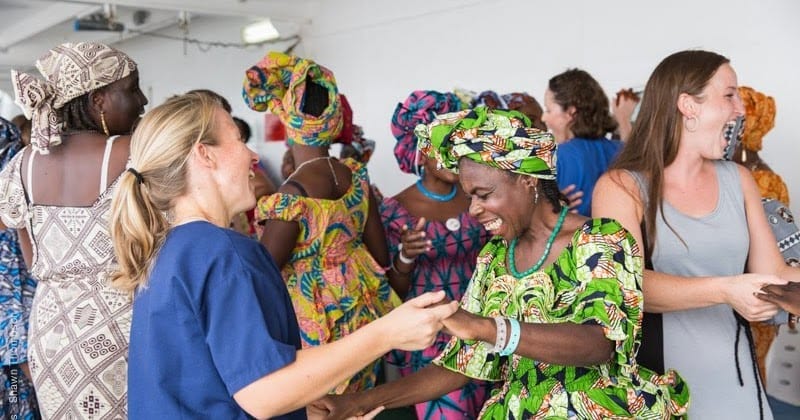A Dress Love

In Douala, at times the grayness of the sky and water is only separated by a small sliver of horizon you can see in the distance. Even the sun seems to have trouble piercing through the thick humidity and haze, and the breeze carries a salty heaviness as the wind comes up off the water. The atmosphere can feel dense and dull.

As I sat up on deck seven on Tuesday afternoon, though, the day felt brighter. There was an excitement that made the space feel light and exciting. Patients from the wards, still in their hospital gowns – some carrying their drains and Foley catheters – sat with #nurses dressed in their navy or royal blue scrubs. Other staff had opted for jeans, or skirts and dresses made from the traditional African patterns. Drums, a bass, and a keyboard were playing a rhythmic beat as everyone stood to dance and clap to welcome our honored guests out onto the deck. One by one, these guests slowly swayed to their seats, in rhythm with the music, regal in the vivid colors of their elaborately beautiful new dresses and matching headdresses, stunning among all the grey of the day. A transformation from the women who had entered the ship weeks ago.
It was Dress Ceremony Day. We were celebrating a small group of women who had recently recovered from a surgical procedure to fix a chronic condition known as VVF- vesicovaginal fistula. In a place without access to C-sections, prolonged or difficult childbirth can lead to a fistula forming between the bladder and the vagina, resulting in uncontrollable leaking of urine, and in severe cases, stool (also known as a rectovaginal fistula). Because there is no proper medical care available during or after the difficult labors, these women are forced to continue through life without the ability to control their urinary or bowel habits. Some are unable to have more children. As a result, many are abandoned by their husbands and ostracized by their communities.
The ceremony is a celebration of their return to society, whole again. The dresses they are given are meant to be a symbol of their innate beauty. Mercy Ships takes the care of these women very seriously, addressing not only the physiological side of their treatment, but the emotional, social, cultural, and spiritual aspects as well. From the beginning, even before their surgical procedures, these women are reminded that they are beautiful, accepted, and loved for who they are.
As I watched the ceremony continue, surrounded by the music and clapping, the dancing, and the bright colors of the African patterns, I saw a young girl, possibly eight or nine years old, watching everything with wide-eyed curiosity. In that moment, I felt true, unadulterated hope. This wasn’t just a dress ceremony. This little girl was watching people from different nations, races, cultures, and languages come together to testify to one simple truth: you are worthy, and you are loved. She will continue beyond that afternoon knowing that her worth is not found in her body, her husband, or her community. It cannot be taken away from her, and I pray that she lives in the truth that she is loved unconditionally by the One who created her.

In a world that can feel so heavy with despair and destruction, where the only good in the middle of all this gray seems as far away as the horizon, we need to know that there is light trying to get through. Healing is active, hope is being restored, and the simplest and truest form of love is being shared and celebrated. And, it will carry on beyond a Tuesday afternoon on deck seven of Mercy Ships.






